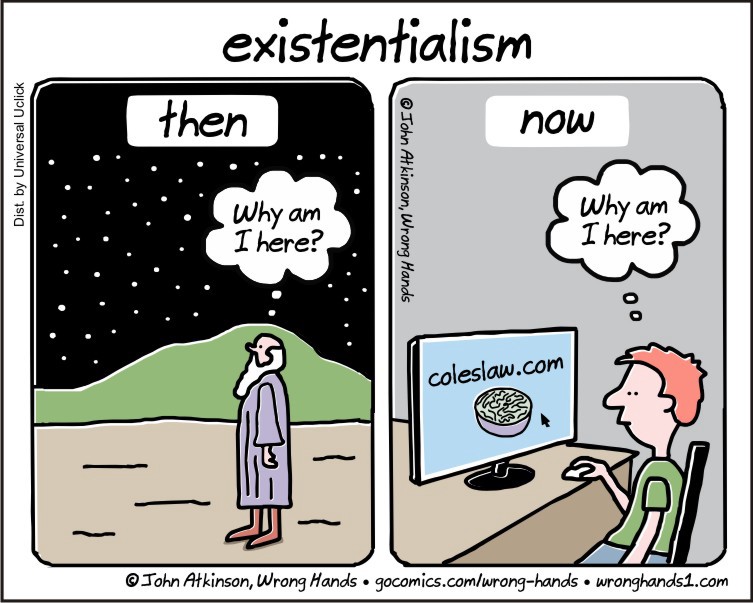
Philosophy has been around since early civilization. Numerous branches have developed all over the world, each one uniquely thought-provoking. Contrary to popular belief, philosophy is not a dry subject with little practical application. It can benefit us in many ways and be a place we can turn to find answers. Consider these six types of philosophy as you contemplate the big questions. (Estimated reading time: 8-9 minutes)
“Science is what you know. Philosophy is what you don’t know.”
— Bertrand Russell
I first considered philosophy when I watched the 13-part PBS mini-series “Cosmos.” This pioneering work by astronomer and astrophysicist Carl Sagan takes viewers on an awe-inspiring journey into the Universe on board the spaceship of their imagination.
I found myself in a daze of wonder as I saw the striking images of distant galaxies and stars while listening to Carl Sagan’s poetic and philosophical narration. He opens the series by speaking about the importance of staying humble as we consider our place in the cosmos. He says:
“Once we overcome our fear of being tiny, we find ourselves on the threshold of a vast and awesome Universe that utterly dwarfs – in time, in space, and in potential – the tidy anthropocentric proscenium of our ancestors.”
According to Sagan, we determine the significance of our lives and our planet based on the courage to ask big questions and find meaning in life. Instead of longing for a parent figure to give us answers, we should use our minds. “Knowledge is preferable to ignorance,” he says.
Based on these ideas, Sagan may come across as a man of pure science, but it doesn’t represent the whole truth. Sagan’s personal philosophy was multifaceted —- he had profound insights into psychology, spirituality, humanism, and literature.
Carl Sagan’s views on the ‘big three’ of Greek philosophy

Sagan critiqued other founders of scientific thought and intellectual giants like Plato, Aristotle, and Pythagoras. Interestingly, Sagan was not a fan of the ancient Greek trio for several reasons, but primarily because they shunned experimentation and believed that the laws of nature could be deduced by thought alone.
“Plato believed that ideas were far more real than the natural world,” Sagan said. “He advised the astronomers not to waste their time observing the stars and planets. It was better, he believed, just to think about them.”
While Sagan acknowledged that Plato, Aristotle, and Pythagoras’ works greatly advanced the cause of science, he thinks they also put a dent in the advancement of humankind. He says:
“In the suppression of disquieting facts, the sense that science should be kept for a small elite, the distaste for experiment, the embrace of mysticism, the easy acceptance of slave societies, their influence has significantly set back the human endeavor.”
My first exposure to philosophical discourse through the lens of Carl Sagan made me curious about other worldviews crafted by thinkers and mystics of different ages.
There are several types of philosophy, each uniquely stimulating. There is no right or wrong, just the ones that best suit our values and perspective.
A brief history of philosophy (and types of philosophy)

Philosophy is as old as civilization. The word philosophy is derived from the Greek words “philo” (love) and “sophia” (wisdom) which translates to “the love of wisdom.” It’s the study of the most fundamental and profound matters of human existence. Branches of different types of philosophy often develop in response to the inability of religion to provide satisfactory answers.
When exactly philosophy developed is not clear, but it likely started as early as the prehistoric age when our stone-age ancestors looked up at the starry sky and wondered about their existence and where they stood in the grand scheme of the Universe.
As the first civilizations appeared on the planet, philosophy became more formalized as a secular or religious system of thought. Creating a clear construct with outlined beliefs made it easier for followers to understand expected attitudes and conduct. Many beliefs were institutionalized as part of culture and offered a cohesive understanding of one’s role in the world.
Early types of philosophy is believed to have first developed in the East in the following ancient civilizations:
- Egypt (4000 BCE) – ma’at (harmony and balance) depicted in tomb paintings
- Mesopotamia (2150 BCE) – philosophical ideas of The Epic of Gilgamesh
- India (1500 – c. 500 BCE) – the Upanishads during the Vedic Period
- Persia (1500 BCE) – Avesta in Zoroastrian scripture
- China (1046-256 BCE) – Confucianism and Taoism
One of the most notable golden ages of philosophy took place in Athens in the 5th century BC. A surge of great thinkers like Aristotle, Plato, and Socrates shaped ideas that informed people for thousands of years. It continued to influence Western civilization and became central to beliefs in Rome, the Middle Ages, and the Renaissance.
Philosophy transformed in the Middle Age when it became enmeshed with Christian teachings and continued to develop during the Renaissance between the 14th and 17th centuries. In the East, Islamic scholars and other cultures developed their own beliefs after the 7th century CE.
Christian-based philosophies dominated until the age of Enlightenment in the 18th century, when new ethical schools of thought began to form. It was during this time that logic, meaning, and language became significant. In the 20th century, we continued with an outpouring of philosophical thought in every field, from politics to artificial intelligence, and science to warfare.
Humans are inclined to build constructs and realities as we search for the “truths” within our existence. Thanks to our predecessors, we now have an array of belief systems we can investigate as we try to satisfy our curiosity and need for wonder.
Why philosophy matters and how it can serve us

Just because many people’s eyes may glaze over when you quote philosophers does not diminish its value. Contrary to popular belief, philosophy is not a dry subject with little practical application — it can benefit us in many ways. Here are a few reasons why philosophy matters:
- It gets us to think critically, improves our reasoning and problem-solving skills, and weeds out bad ideas.
- It teaches us the art of persuasion and how to back up our ideas and arguments.
- We can apply a philosophical framework to streamline the earning process.
- It helps us reflect on our own beliefs and perspectives and choose the most useful ones.
- We better understand the various factors that influence our culture, including politics, the economy, social movements, human rights, and ethics, and decide where we stand on these issues.
- We’re better equipped to engage in debates and discussions that involve change and progress in our society.
- It guides us through the research process and gives structure to understanding data and information.
- It helps us develop hypotheses by using sound reasoning and judgment.
- It helps us tackle complex issues at work and further our career growth.
- It gives us a template to consider our life’s purpose and what we want from it.
With these benefits in mind, you can confidently choose the types of philosophy that most resonate with you and which you think will serve you best in your life’s journey.
6 types of philosophy that will enrich your worldview

While there’s a profusion of philosophical schools of thought from every corner of the globe, across different eras, these six are known to be the most influential in Western society:
1. Stoicism
Origin: Ancient Greece and Rome.
Key figures: Marcus Aurelius, Epictetus, Seneca.
Stoicism is an ancient Greek and Roman school of philosophy that hails from the 3rd century BC. The Stoics are known for asserting the practice of virtues and their necessity in maintaining a tranquil mind and living an ethical life. The Stoic philosophy states that we don’t react to events but react to our judgments of them. Another belief is that we should not talk about things beyond our control and instead focus on things we can control. In the last decades, Stoicism has experienced a renaissance, with politicians, artists, writers, and entrepreneurs interested in adopting its ideas.
2. Rationalism
Origin: The Age of Reason during the 17th century.
Key figures: René Descartes, Baruch Spinoza, Gottfried Leibniz, Immanuel Kant.
Rationalism is the view that reason is the chief source of knowledge and justification. According to this philosophy, the criterion for the truth isn’t sensory but intellectual and deductive. This contrasts with empiricism, another notable philosophy that states that the senses are enough to justify knowledge. Rationalists believe that reality is inherently logical and that a class of truth exists that only the intellect can grasp directly. Rationalism is still used as a framework in decision-making.
3. Realism
Origin: Ancient Greece.
Key figures: Aristotle, Plato, John Locke, George Berkeley, David Hume.
Realism is the belief that the reality of material objects and abstract concepts are independent of how it is viewed. Realism is not a position, but a stance one adopts toward a subject matter. It’s not based on linguistic practices, beliefs, and conceptual schemes; therefore, objects can exist without the act of perception. This can apply to the past and future, the physical world, other minds, and ourselves, as well as macro concepts like universals, moral truths, and mathematical truths.
4. Nihilism
Origin: 19th-century Russia during the early reign of Tsar Alexander II.
Key figures: Friedrich Nietzsche, Friedrich Jacobi, Søren Kierkegaard, Ivan Turgenev, Albert Camus.
Nihilism is a philosophy that everything is meaningless and has no purpose. It comes from the Latin word “nihil,” meaning “nothing. The belief rejects generally accepted or fundamental aspects of human existence and the values they place on people, objects, and truths like morality, values, knowledge, and meaning. Nihilism was popularized by Friedrich Nietzsche, who used it to describe the demise of traditional morality in Western society.
5. Idealism
Origin: In the 18th century, Bishop George Berkeley, known as the “Father of Idealism,” formulated one of its purest forms. However, Indian and Greek philosophers proposed the earliest forms.
Key figures: Plato, Immanuel Kant, Gottfried Wilhelm Leibniz, Georg Wilhelm Friedrich Hegel.
Idealism asserts that reality is grounded in perception (in some types, the spiritual interpretation) of physical reality. In other words, the thoughts and ideas of the mind constitute the essence of the fundamental nature of reality. This contrasts with realism, which states that material things exist independently of perception. Several types of Idealism include Platonic Idealism, epistemological Idealism, objective Idealism, subjective Idealism, transcendental Idealism, and absolute Idealism.
6. Existentialism
Origin: Existentialism in its first recognized form can be traced back to the 19th century in the works of the German philosopher Friedrich Nietzsche and Danish philosopher Søren Kierkegaard.
Key figures: Søren Kierkegaard, Friedrich Nietzsche, Martin Heidegger, Jean-Paul Sartre.
Existentialism is a belief that highlights the existence of the individual, choice, and freedom. It states that purpose and meaning are not given to us by religion, teachers, governments, or authorities, and that we define our own meaning in life. Despite living in an irrational universe, we can tap into our subjective experience of feeling, thinking, and action to make sense of the nothingness and embrace existence. According to this philosophy, individuals have freedom but must take responsibility for themselves and their decisions and use it to rise above human suffering and inevitable death.
One of my favorite quotes is from Shakespeare’s Hamlet: “there is nothing good or bad, but thinking makes it so.” When applied to types of philosophy, there is no right or wrong view when perceiving reality. What matters is how we interpret the beliefs and use them in our lives.
No matter what perspective you take, make sure that it brings out the best in you.
All my best on your journey,
Seline

Question for you: Which of these six types of philosophy resonates most with you? Are there any other philosophies that you like that aren’t listed here?
Did you like this post? Sign up below, and I’ll send you more awesome posts like this every week.

This was a fascinating read. It was nice to get a concise overview of all the majoy philosophies. Thank you.
Great to hear, thanks!